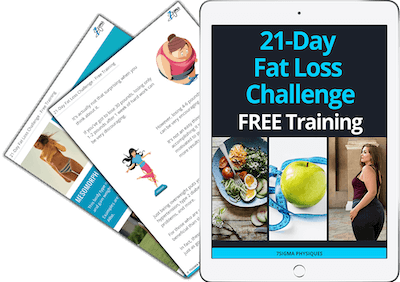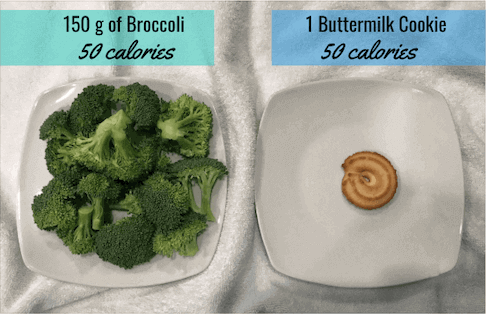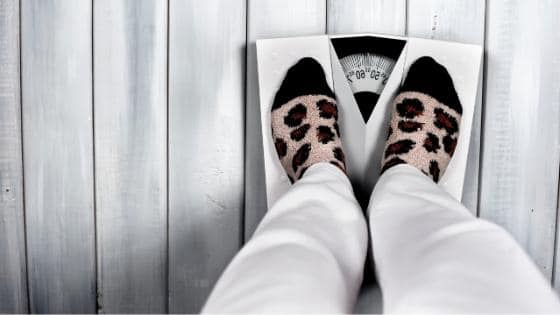Weight loss is more than just having the perfect diet and exercise routine.
A successful weight loss plan takes into consideration your habits and guides you through the steps of changing them to help you keep the weight off.
A good program needs to teach you how to think for yourself and make decisions based on your own likes, dislikes, genetics, schedule, and metabolism.
In this article, I go over 4 horrible habits preventing you from losing weight.
1. Eating to get rid of hunger, not to fuel your body
We often get so carried away with the busyness of life that we neglect our health.
People see hunger as an “inconvenience” or “something to get rid of.” They say, “ugh, I’m just going to eat this so I’m not hungry.”
We must remember that our bodies make us hungry because it needs nutrients, vitamins, and minerals to maintain healthy function.
It’s like drinking coffee
Giving your body low-quality foods just to get rid of hunger is like drinking coffee to stay awake.
You can drink all the coffee you want, but your body will eventually start feeling sick if not given proper rest.
Here’s what happens when you don’t sleep:
- At 24 hours: Impaired memory and judgment
- 36 hours: Increased inflammation
- 48 hours: Disorientation
- 72 hours: Hallucinations
The difference between lack of sleep and lack of nutrients is that the effects of a bad diet are not as immediate.
Obesity-related diseases, such as type 2 diabetes, high blood pressure, stroke, and arthritis develop slowly over time.
It isn’t until we start having nerve, eye and kidney damage, skin conditions, or hearing impairment that we start taking our diet seriously.
Certainly, you wouldn’t drink coffee every night so you never sleep, so why would you eat low-quality foods just to curb hunger?

Here’s a list of some nutrient-dense foods you can add to your diet:
- Nutrient-dense carbs, such as sweet potatoes, quinoa, wild rice, whole grains, rolled oats, beans, legumes, whole-wheat pasta, fruits, and vegetables.
- High protein foods, such as tuna, tilapia, chicken breast, lean ground beef, egg-whites, lean ground turkey, lean red meat, and greek yogurt.
- Healthy fat sources, such as avocados, extra virgin olive oil, coconut oil, whole eggs, almonds, and seeds.
Limit your intake of processed foods as they are often stripped from their nutrients and are digested faster, which will leave you feeling hungry pretty quickly.
Here are 5 alarming reasons you’re always hungry, if you’d like to explore more.
Start your journey to losing 10-21 pounds in just 21 days.
Get the free 21-Day Fat Loss Challenge training guide!

2. Forming Alibis
Truth is, there are always a million reasons why not to do something.
Next time you find yourself creating an excuse about why you can’t do something, stop and analyze the true reason behind it.
Here are a few common reasons behind people’s excuses:
- Fear of failure
- Fear of being criticized
- Lack of self-esteem
- They believe the lie that they’re born a certain way and can’t change
- They think they don’t have time
In order to remove alibis, you must think deeply and be honest with yourself.
For example, if your “issue” is that you don’t have enough time, write down everything that you do during the day, how much time you spend on your phone or watching TV.
Spending 10 minutes on your phone every few hours can add up to a significant amount of wasted time. Given a 24-hour day, a 30-minute workout is only 2% of your day.
If your excuse is that you don’t have enough money, then consider keeping better track of your finances.
Pay close attention to the little inexpensive things that you buy as they often add up to a large amount of money.
Here are 8 tips you can use if you’re trying to lose weight on a budget.
I often suggest having someone whom you trust and knows you well to help you do a complete evaluation of yourself and your habits.
3. Lack of Definiteness
Another horrible habit is the habit of not being specific about your goals and your plan to achieve them.
Example of bad goals:
- I’m going to lose weight
- I want to eat healthier
- I will exercise more
Example of good and specific goals:
- I will lose 20 pounds by December 31st
- I’m going to eat 1 serving of vegetables at each meal
- I will go to the gym every Monday, Wednesday, and Friday at 6:00 am
If you don’t have a definite plan of action, you’re most likely to end up procrastinating and not doing anything.
Setting SMART goals and having a definite plan of action are one of the 4 crucial things you must do before starting a diet.
Working on your habits is not only important for losing weight but to be able to actually keep it off.
Here are 7 small habits that can make weight loss easier.
It’s hard to change your habits
Changing your habits takes hard work, but everything worthwhile does.
Don’t expect to change overnight or get discouraged when you have bad days, be persistent and you’ll eventually succeed.
The problem is that people quit too soon, they don’t like working hard for anything. It’s easier to be lazy and go with the flow.
But you are champion, you’re not like everyone else, the fact that you’re reading this means that you are seeking knowledge and something inside of you wants to change.
Don’t give up!
4. Guesstimating Your Portions
We often convince ourselves that we’re eating less or eating healthier when in reality, we aren’t.
Truth is, we can’t really know how much we’re eating if we’ve never even bothered to read the nutrition label on the foods we eat.
So if you’re trying to lose weight, but the scale isn’t budging, and are not tracking your foods in some sort of way, chances are you’re wrongly estimating your calories.
Throughout the years, I’ve learned that “kind of” doing something will “kind of” get you results. If you want something, do your best to do it right the first time.
People often tend to wrongly estimate their portions and neglect “small” snacks that end up adding tons of unwanted calories.
Here’s how the bad habit of guesstimating your portions could be preventing you from losing weight:
1. You’re Most Likely Estimating Wrong
Without previous knowledge of weighing and tracking your foods, chances are you have no idea how many calories are in the foods you’re eating.
You’re probably guiding yourself by how a food “looks.”
For example, a serving of Oreos (3 cookies) might not look like a lot of food but has 160 calories.
On the other hand, 2 cups of broccoli might look like a lot of food, but it only has 60 calories!

If you eat out often, you’re also likely to be underestimating your calories.
Restaurant foods tend to have lots of fats and sugars to give food flavor; however, they usually come with a lot of calories.
If you tend to eat out a lot, here are 5 tips to keep your calories low when doing so.
Thinking “Healthy” Foods Don’t Have Many Calories
Another thing making you estimate your calories wrong might be foods labeled as “healthy,” but actually have tons of calories, like fruit juices.
Here’s a list of 10 “healthy” foods that could be making you gain weight.
Start your journey to losing 10-21 pounds in just 21 days.
Get the free 21-Day Fat Loss Challenge training guide!

Test it yourself
In a piece of paper, write down all the foods you eat during a day. At the end of the day, write down how many total calories you think you ate (without looking at the nutrition labels).
The next day, eat the same foods, but this time record the number of calories each food has as you eat them.
You can use apps like MyFitnessPal or do it manually by looking at the nutrition label and writing them down.
Then compare your estimated value with the “actual” value and you’ll be surprised.
note: tracking apps and nutrition labels are also not very accurate, but they are very useful for having a baseline to go off of.
If you don’t know how to read nutrition labels, you can learn to do so in my article on how to read nutrition labels.
I also have an article on how to use MyFitnessPal to track calories and macros if you need help with that as well.
2. Not Counting Snacks or “Small Foods”
Snacks and “small foods” are constantly neglected by people, however, they are typically what makes them gain weight.
For example, snacking on 1 serving of almonds (about 28 almonds) might seem “small,” but that’s 170 calories!
Things like coffee with cream and sugar, some crackers, can result in a significant amount of extra calories.
If you love snacking, try going for low-carb snacks instead of sugary ones.
3. It’s Difficult to Remember What You’ve Eaten
Remembering things is already challenging, now add to that the stresses and business of your day and you are sure to forget what you’ve eaten.
Again, you might remember your bigger meals but completely forget about the snacks you’ve been having.
This can lead to overeating and ultimately, weight gain.
What to Do
Years ago, tracking calories would’ve been a hassle. Luckily, we now have a variety of applications, such as MyFitnessPal that make this process easy.
It is the best way for you to get familiarized with food composition and know how much you’re eating.
One of the characteristics that people who are able to lose weight and actually keep it off in the long-term have in common is that they all track their food intake in one way or another.
Besides, you don’t have to track your calories forever, once you’ve gotten familiarized with food composition you’ll be able to ditch the app and eat by intuition.
Note: don’t expect to be eating by intuition in a week or two, this will take months of practice and learning, but it’s definitely a skill worth having.
Here are 7 effective tips to stop overeating.
Your health is an investment, not an expense.
Do you know of any other horrible habits preventing you from losing weight? Let me know in the comments section below!
If you’re ready to start your weight loss journey, Avocadu’s 21-Day Fat Loss Challenge is the place to start!
This plan helps men and women lose 10-21 pounds in just 21 days and can be repeated as many times as you want.





